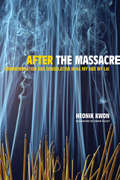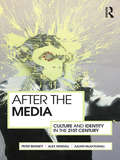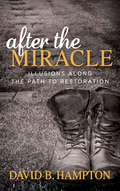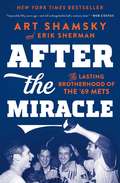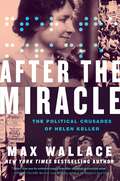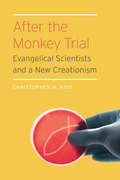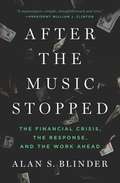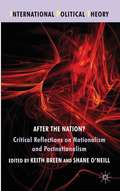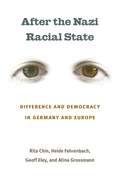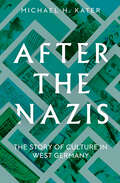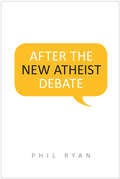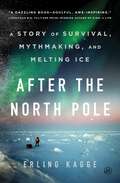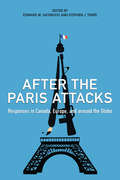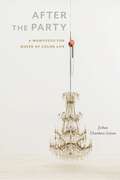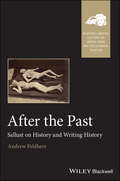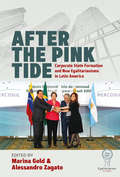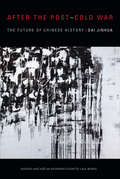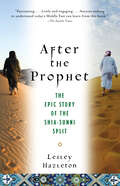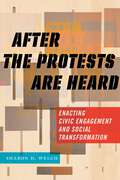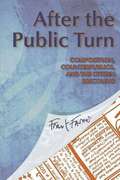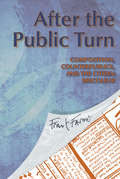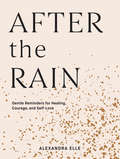- Table View
- List View
After the Massacre: Commemoration and Consolation in Ha My and My Lai
by Heonik Kwon Drew FaustThough a generation has passed since the massacre of civilians at My Lai, the legacy of this tragedy continues to reverberate throughout Vietnam and the rest of the world. This engrossing study considers how Vietnamese villagers in My Lai and Ha My--a village where South Korean troops committed an equally appalling, though less well-known, massacre of unarmed civilians--assimilate the catastrophe of these mass deaths into their everyday ritual life. Based on a detailed study of local history and moral practices, After the Massacre focuses on the particular context of domestic life in which the Vietnamese villagers interact with their ancestors on one hand and the ghosts of tragic death on the other. Heonik Kwon explains what intimate ritual actions can tell us about the history of mass violence and the global bipolar politics that caused it. He highlights the aesthetics of Vietnamese commemorative rituals and the morality of their practical actions to liberate the spirits from their grievous history of death. The author brings these important practices into a critical dialogue with dominant sociological theories of death and symbolic transformation.
After the Media: Culture and Identity in the 21st Century
by Peter Bennett Julian McDougall Alex KendallThis provocative text considers the state of media and cultural studies today after the demolition of the traditional media paradigm, and engages with the new, active consumer culture. Media Studies, particularly within schools, has until recently been concerned with mass media and the effects of ‘the media’ in society and on people. As new media technology has blurred the boundaries between the audience and the media, the status of this area of education is threatened. Whilst some have called for a drastic re-think (Media Studies 2.0), others have called for caution, arguing that the power dynamics of ownership and gatekeeping are left intact. This book uses cultural and technological change as a context for a more forensic exploration of the traditional dependence on the idea of ‘the media’ as one homogenous unit. It suggests that it would be liberating for students, teachers and academics to depart from such a model and shift the focus to people and how they create culture in this contemporary ‘mediascape’.
After the Miners’ Strike: A39 and Cornish Political Theatre versus Thatcher’s Britain Volume 1
by Paul FarmerIn this rich memoir, the first of two volumes, Paul Farmer traces the story of A39, the Cornish political theatre group he co-founded and ran from the mid-1980s to the early 1990s. Farmer offers a unique insight into A39’s creation, operation, and artistic practice during a period of convulsive political and social change.
After the Miracle: Illusions Along the Path to Restoration
by David B. HamptonWhat happens when the miracle of sobriety shakes up the way we’ve trained the people in our lives to treat us as opposed to what we need from them now? Where do we turn when getting what we’ve prayed for messes up everything we thought we knew and believed? After the Miracle: Illusions On the Path To Restoration addresses the illusions we have as we begin to break the cycles in our lives and face the reality of what healthy living will really cost. David Hampton poses a realistic view of what the path will be to a new way of being for everyone concerned After the Miracle.
After the Miracle: The Lasting Brotherhood of the '69 Mets
by Erik Sherman Art ShamskyThe inside account of an iconic team in baseball history: the 1969 New York Mets—a consistently last-place team that turned it all around in just one season—told by ’69 Mets outfielder Art Shamsky, Hall of Fame pitcher Tom Seaver, and other teammates as they reminisce about what happened then and where they are today. <P><P>The New York Mets franchise began in 1962 and the team finished in last place nearly every year. When the 1969 season began, fans weren’t expecting much from “the Lovable Losers.” But as the season progressed, the Mets inched closer to first place and then eventually clinched the National League pennant. <P><P>They were underdogs against the formidable Baltimore Orioles, but beat them in five games to become world champions. <P><P>No one had predicted it. In fact, fans could hardly believe it happened. <P><P>Suddenly they were “the Miracle Mets.” Playing right field for the ’69 Mets was Art Shamsky, who had stayed in touch with his former teammates over the years. He hoped to get together with star pitcher Tom Seaver (who would win the Cy Young award as the best pitcher in the league in 1969 and go on to become the first Met elected to the Hall of Fame) but Seaver was ailing and could not travel. So, Shamsky organized a visit to Tom Terrific in California, accompanied by the #2 pitcher, Jerry Koosman, outfielder Ron Swoboda, and shortstop Bud Harrelson. <P><P>Together they recalled the highlights of that amazing season as they reminisced about what changed the Mets’ fortunes in 1969. With the help of sportswriter Erik Sherman, Shamsky has written After the Miracle for the 1969 Mets. <P><P>This is a book that every Mets fan—and every baseball fan—must own.
After the Miracle: The Political Crusades of Helen Keller
by Max WallaceIn this "stunning" new history, New York Times bestselling author Max Wallace draws on groundbreaking research to reframe Helen Keller&’s journey after the miracle at the water pump, vividly bringing to light her rarely discussed, lifelong fight for social justice across gender, class, race, and ability (Rosemary Sullivan, New York Times bestselling author).Kirkus Best Nonfiction Book of 2023 Raised in Alabama, she sent shockwaves through the South when she launched a public broadside against Jim Crow and donated to the NAACP. She used her fame to oppose American intervention in WWI. She spoke out against Hitler the month he took power in 1933 and embraced the anti-fascist cause during the Spanish Civil War. She was one of the first public figures to alert the world to the evils of Apartheid, raising money to defend Nelson Mandela when he faced the death penalty for High Treason, and she lambasted Joseph McCarthy at the height of the Cold War, even as her contemporaries shied away from his notorious witch hunt. But who was this revolutionary figure? She was Helen Keller. From books to movies to Barbie dolls, most mainstream portrayals of Keller focus heavily on her struggles as a deafblind child—portraying her Teacher, Annie Sullivan, as a miracle worker. This narrative—which has often made Keller a secondary character in her own story—has resulted in few people knowing that her greatest accomplishment was not learning to speak, but what she did with her voice when she found it.After the Miracle is a much-needed corrective to this antiquated narrative. In this first major biography of Keller in decades, Max Wallace reveals that the lionization of Sullivan at the expense of her famous pupil was no accident, and calls attention to Keller&’s efforts as a card-carrying socialist, fierce anti-racist, and progressive disability advocate. Despite being raised in an era when eugenics and discrimination were commonplace, Keller consistently challenged the media for its ableist coverage and was one of the first activists to highlight the links between disability and capitalism, even as she struggled against the expectations and prejudices of those closest to her. Peeling back the curtain that obscured Keller&’s political crusades in favor of her &“inspirational&” childhood, After the Miracle chronicles the complete legacy of one of the 20th century&’s most extraordinary figures.
After the Monkey Trial: Evangelical Scientists and a New Creationism
by Christopher M. RiosIn the well-known Scopes "Monkey Trial" of 1925, famously portrayed in the film and play Inherit the Wind, William Jennings Bryan's fundamentalist fervor clashed with defense attorney Clarence Darrow's aggressive agnosticism, illustrating what current scholars call the conflict thesis. Itappeared, regardless of the actual legal question of the trial, that Christianity and science were at war with each other. Decades later, a new generation of evangelical scientists struggled to restore peace. After the Monkey Trial is the compelling history of those evangelical scientists in Britainand America who, unlike their fundamentalist cousins, supported mainstream scientific conclusions of the world and resisted the anti-science impulses of the era. This book focuses on two organizations, the American Scientific Affiliation and the Research Scientists' Christian Fellowship (today Christians in Science), who for more than six decades have worked to reshape the evangelical engagement with science and redefine what it means to be acreationist.
After the Music Stopped
by Alan S. BlinderNamed one of the Ten Best Books of 2013 by Michiko Kakutani and the New York Times Book Review "Blinder is a master storyteller . . . one of the best books yet about the financial crisis." --The Wall Street Journal Alan S. Blinder--esteemed Princeton professor, Wall Street Journal columnist, and former vice chairman of the Federal Reserve Board under Alan Greenspan--is one of our wisest and most clear-eyed economic thinkers. In After the Music Stopped, he delivers a masterful narrative of how the worst economic crisis in postwar American history happened, what the government did to fight it, and what we must do to recover from it. With bracing clarity, Blinder chronicles the perfect storm of events beginning in 2007, from the bursting of the housing bubble to the implosion of the bond bubble, and how events in the U.S. spread throughout the interconnected global economy. Truly comprehensive and eminently readable, After the Music Stopped is the essential book about the financial crisis.
After the Music Stopped: The Financial Crisis, the Response, and the Work Ahead
by Alan S. BlinderNew York Times BestsellerOne of our wisest and most clear-eyed economic thinkers offers a masterful narrative of the crisis and its lessons.Many fine books on the financial crisis were first drafts of history—books written to fill the need for immediate understanding. Alan S. Blinder, esteemed Princeton professor, Wall Street Journal columnist, and former vice chairman of the Federal Reserve Board, held off, taking the time to understand the crisis and to think his way through to a truly comprehensive and coherent narrative of how the worst economic crisis in postwar American history happened, what the government did to fight it, and what we can do from here—mired as we still are in its wreckage.With bracing clarity, Blinder shows us how the U.S. financial system, which had grown far too complex for its own good—and too unregulated for the public good—experienced a perfect storm beginning in 2007. Things started unraveling when the much-chronicled housing bubble burst, but the ensuing implosion of what Blinder calls the “bond bubble” was larger and more devastating. Some people think of the financial industry as a sideshow with little relevance to the real economy—where the jobs, factories, and shops are. But finance is more like the circulatory system of the economic body: if the blood stops flowing, the body goes into cardiac arrest. When America’s financial structure crumbled, the damage proved to be not only deep, but wide. It took the crisis for the world to discover, to its horror, just how truly interconnected—and fragile—the global financial system is. Some observers argue that large global forces were the major culprits of the crisis. Blinder disagrees, arguing that the problem started in the U.S. and was pushed abroad, as complex, opaque, and overrated investment products were exported to a hungry world, which was nearly poisoned by them.The second part of the story explains how American and international government intervention kept us from a total meltdown. Many of the U.S. government’s actions, particularly the Fed’s, were previously unimaginable. And to an amazing—and certainly misunderstood—extent, they worked. The worst did not happen. Blinder offers clear-eyed answers to the questions still before us, even if some of the choices ahead are as divisive as they are unavoidable. After the Music Stopped is an essential history that we cannot afford to forget, because one thing history teaches is that it will happen again.
After the Nation?
by Neil Keith Breen Shane O 8216Explores the ways in which the nation-state and nationalism are challenged by contemporary realities. This volume addresses changes to our understanding of national sovereignty, problems posed by violent conflict between rival national projects, the feasibility of postnationalist democracy and citizenship, and the debate over global justice.
After the Nazi Racial State: Difference and Democracy in Germany and Europe
by Geoff Eley Rita Chin Heide Fehrenbach Atina GrossmannWhat happened to "race," race thinking, and racial distinctions in Germany, and Europe more broadly, after the demise of the Nazi racial state? This book investigates the afterlife of "race" since 1945 and challenges the long-dominant assumption among historians that it disappeared from public discourse and policy-making with the defeat of the Third Reich and its genocidal European empire. Drawing on case studies of Afro-Germans, Jews, and Turks---arguably the three most important minority communities in postwar Germany---the authors detail continuities and change across the 1945 divide and offer the beginnings of a history of race and racialization after Hitler. A final chapter moves beyond the German context to consider the postwar engagement with "race" in France, Britain, Sweden, and the Netherlands, where waves of postwar, postcolonial, and labor migration troubled nativist notions of national and European identity. After the Nazi Racial State poses interpretative questions for the historical understanding of postwar societies and democratic transformation, both in Germany and throughout Europe. It elucidates key analytical categories, historicizes current discourse, and demonstrates how contemporary debates about immigration and integration---and about just how much "difference" a democracy can accommodate---are implicated in a longer history of "race." This book explores why the concept of "race" became taboo as a tool for understanding German society after 1945. Most crucially, it suggests the social and epistemic consequences of this determined retreat from "race" for Germany and Europe as a whole.
After the Nazis: The Story of Culture in West Germany
by Michael H. KaterA wide-ranging, insightful history of culture in West Germany—from literature, film, and music to theater and the visual arts After World War II a mood of despair and impotence pervaded the arts in West Germany. The culture and institutions of the Third Reich were abruptly dismissed, yet there was no immediate return to the Weimar period&’s progressive ideals. In this moment of cultural stasis, how could West Germany&’s artists free themselves from their experiences of Nazism? Moving from 1945 to reunification, Michael H. Kater explores West German culture as it emerged from the darkness of the Third Reich. Examining periods of denial and complacency as well as attempts to reckon with the past, he shows how all postwar culture was touched by the vestiges of National Socialism. From the literature of Günter Grass to the happenings of Joseph Beuys and Karlheinz Stockhausen&’s innovations in electronic music, Kater shows how it was only through the reinvigoration of the cultural scene that West Germany could contend with its past—and eventually allow democracy to reemerge.
After the New Atheist Debate
by Phil RyanThe first decade of the twenty-first century saw a number of best-selling books which not only challenged the existence of god, but claimed that religious faith was dangerous and immoral. The New Atheists, as writers such as Richard Dawkins, Christopher Hitchens, Sam Harris, and Daniel Dennett have become known, sparked a vicious debate over religion's place in modern society.In After the New Atheist Debate, Phil Ryan offers both an elegant summary of this controversy and a path out of the cul-de-sac that this argument has become. Drawing on the social sciences, philosophy, and theology, Ryan examines the claims of the New Atheists and of their various religious and secular opponents and finds both sides wanting.Rather than the mutual demonization that marks the New Atheist debate, Ryan argues that modern society needs respectful ethical dialogue in which citizens present their points of view and seek to understand the positions of others. Lucidly written and clearly argued, After the New Atheist Debate is a book that brings welcome clarity and a solid path to the often contentious conversation about religion in the public sphere.
After the North Pole: A Story of Survival, Mythmaking, and Melting Ice
by Erling KaggeThe Norwegian explorer, philosopher and acclaimed writer tells of his historic 58-day journey to the North Pole on skis in this provocative memoir that is a profound meditation on nature and the history of explorers' obsession. The North Pole looms large in our collective psyche—the ultimate Otherland in a world mapped and traversed. It is the center of our planet’s rotation, one of the places that is most vulnerable in an epoch of global climate change. Its sub-zero temperatures and strange year of one sunset and one sunrise make it an eerie, utterly disorienting place that challenges human endurance and understanding.Erling Kagge and his friend Børge Ousland became the first people “to ever reach the pole without dogs, without depots and without motorized aids,” skiing for 58 days from a drop off point on the ice edge of Canada’s northernmost island.Erling describes his record-making journey, probing the physical challenges and psychological motivations for embarking on such an epic expedition, the history of the territory’s exploration, its place in legend and art, and the thrilling adventures he experienced during the trek. It is another example of what bestselling author Robert MacFarlane has called “Kagge’s extraordinary life in wild places,”Erling also observes the key role that this place holds in our current climate and geopolitical conversations. As majestic, mesmerizing, and monumental as the terrain it captures, After the North Pole is for anyone who has gazed out at the horizon—and wondered what happens if you keep going.After the North Pole is illustrated with 12-14 photographs.Translated from the Norwegian by Kari Dickson.
After the Paris Attacks: Responses in Canada, Europe, and around the Globe
by Stephen J. Toope Edward M. IacobucciThe violent attacks on journalists at Charlie Hebdo and shoppers in a Jewish supermarket in Paris in January 2015 raise important questions concerning security, terrorism, and the role of the media in fostering public debate about multiculturalism and freedom of expression. After the Paris Attacks brings together a group of leading scholars, journalists, and political observers to explore how the world reacted to these events and to examine what opportunities exist for a saner and safer future. This timely, interdisciplinary volume presents perspectives from experts in fields such as law, political science, philosophy, and international relations, as well as from the media, offering penetrating insights into how the world can and should respond to the challenge of recent events.
After the Party: A Manifesto for Queer of Color Life (Sexual Cultures #4)
by Joshua Chambers-LetsonWinner, 2019 ATHE Outstanding Book Award, given by the Association for Theatre in Higher EducationWinner, 2018 Errol Hill Award in African American theater, drama, and/or performance studies, presented by the American Society for Theatre ResearchA new manifesto for performance studies on the art of queer of color worldmaking. After the Party tells the stories of minoritarian artists who mobilize performance to produce freedom and sustain life in the face of subordination, exploitation, and annihilation. Through the exemplary work of Nina Simone, Jorge Ignacio Cortiñas, Danh Vō, Felix Gonzalez-Torres, Eiko, and Tseng Kwong Chi, and with additional appearances by Nao Bustamante, Audre Lorde, Martin Wong, Assata Shakur, and Nona Faustine, After the Party considers performance as it is produced within and against overlapping histories of US colonialism, white supremacy, and heteropatriarchy. Building upon the thought of José Esteban Muñoz alongside prominent scholarship in queer of color critique, black studies, and Marxist aesthetic criticism, Joshua Chambers-Letson maps a portrait of performance’s capacity to produce what he calls a communism of incommensurability, a practice of being together in difference. Describing performance as a rehearsal for new ways of living together, After the Party moves between slavery, the Civil Rights Movement, the first wave of the AIDS crisis, the Vietnam War, and the catastrophe-riddled horizon of the early twenty-first century to consider this worldmaking practice as it is born of the tension between freedom and its negation. With urgency and pathos, Chambers-Letson argues that it is through minoritarian performance that we keep our dead alive and with us as we struggle to survive an increasingly precarious present.
After the Past: Sallust on History and Writing History (Blackwell-Bristol Lectures on Greece, Rome and the Classical Tradition)
by Andrew FeldherrProvides a unique and accessible understanding of Sallust and his influence on writing the history of Rome Gaius Sallustius Crispus (‘Sallust’, 86-35 BCE) is the earliest Roman historian from whom any works survive. His two extant writings chronicle crucial moments of a political, social, and ethical revolution with profound consequences for his own life and those of his audience. After the Past: Sallust on History and Writing History examines what it meant to write the history of contentious events—Catiline’s famous rebellion in 63 BCE and the war waged against the North African king Jugurtha fifty years earlier—while their effects were still so vividly felt. One of the first book-length treatments of Sallust in over fifty years, the text offers a comprehensive reading of Sallust’s works using the tools of narratology and intertextual analysis to reveal the changing functions of historiography at the end of the Roman Republic. Author Andrew Feldherr’s comprehensive approach examines the literary strategies used by Sallust and many of the most interesting and significant aspects of the historian’s accomplishment while advancing the study of historiography as a literary form, reconsidering its relationship to rival genres such as rhetoric and tragedy. Pursuing a focused and distinctive scholarly argument, this book: Provides a comprehensive approach to Sallust’s extant works Explores how Sallust helped his readers to reflect on their own relationship with their tumultuous past Contributes to understanding Roman conceptualizations of space and of writing Challenges the core assumption that literary historiography of the time period is essentially rhetorical nature After the Past: Sallust on History and Writing History is an accessible and useful resource for students of Latin literature and Roman history from the advanced undergraduate through professional levels, and for all those with an interest in historiography as a literary genre in Greco-Roman antiquity and in the literary history of the late Republic and triumviral period.
After the Pink Tide: Corporate State Formation and New Egalitarianisms in Latin America (Egalitarianism #1)
by Alessandro Zagato Marina GoldThe left-wing Pink Tide movement that swept across Latin America seems now to be overturned, as a new wave of free-market thinkers emerge across the continent. This book analyses the emergence of corporate power within Latin America and the response of egalitarian movements across the continent trying to break open the constraints of the state. Through an ethnographically grounded and localized anthropological perspective, this book argues that at a time when the regular structures of political participation have been ruptured, the Latin American context reveals multiple expressions of egalitarian movements that strive (and sometimes momentarily manage) to break through the state’s apparatus.
After the Post–Cold War: The Future of Chinese History (Sinotheory)
by Lisa Rofel Jinhua DaiIn After the Post–Cold War eminent Chinese cultural critic Dai Jinhua interrogates history, memory, and the future of China as a global economic power in relation to its socialist past, profoundly shaped by the Cold War. Drawing on Marxism, post-structuralism, psychoanalysis, and feminist theory, Dai examines recent Chinese films that erase the country’s socialist history to show how such erasure resignifies socialism’s past as failure and thus forecloses the imagining of a future beyond that of globalized capitalism. She outlines the tension between China’s embrace of the free market and a regime dependent on a socialist imprimatur. She also offers a genealogy of China’s transformation from a source of revolutionary power into a fountainhead of globalized modernity. This narrative, Dai contends, leaves little hope of moving from the capitalist degradation of the present into a radical future that might offer a more socially just world.
After the Prophet: The Epic Story of the Shia-Sunni Split in Islam
by Lesley HazletonIn this gripping narrative history, Lesley Hazleton tells the tragic story at the heart of the ongoing rivalry between the Sunni and Shia branches of Islam, a rift that dominates the news now more than ever. Even as Muhammad lay dying, the battle over who would take control of the new Islamic nation had begun, beginning a succession crisis marked by power grabs, assassination, political intrigue, and passionate faith. Soon Islam was embroiled in civil war, pitting its founder's controversial wife Aisha against his son-in-law Ali, and shattering Muhammad&’s ideal of unity. Combining meticulous research with compelling storytelling, After the Prophet explores the volatile intersection of religion and politics, psychology and culture, and history and current events. It is an indispensable guide to the depth and power of the Shia–Sunni split.
After the Protests Are Heard: Enacting Civic Engagement and Social Transformation (Religion and Social Transformation #7)
by Sharon D. WelchBuilding generative communities and the catalytic engagement for enduring social transformationFrom the Women’s March in D.C. to #BlackLivesMatter rallies across the country, there has been a rising wave of protests and social activism. These events have been an important part of the battle to combat racism, authoritarianism, and xenophobia in Trump’s America. However, the struggle for social justice continues long after the posters and megaphones have been packed away. After the protests are heard, how can we continue to work toward lasting change? This book is an invaluable resource for anyone invested in the fight for social justice. Welch highlights examples of social justice work accomplished at the institutional level. From the worlds of social enterprise, impact investing, and sustainable business, After the Protests Are Heard describes the work being done to promote responsible business practices and healthy, cooperative communities. The book also illuminates how colleges and universities educate students to strive toward social justice on campuses across the country, such as the Engaged Scholarship movement, which fosters interactions between faculty and students and local and global communities. In each of these instances, activists work from within institutions to transform practices and structures to foster justice and equality. After the Protests Are Heard confronts the difficult reality that social change is often followed by spikes in violence and authoritarianism. It offers vital insights into how our nation might fully acknowledge the brutal costs of racism and the historical drivers of racial injustice, and how people of all races can contain such violence in the present and prevent its resurgence in the future. After the Protests Are Heard is a must-read for everyone interested in social justice and activism—from the barricades and campuses to the breakrooms, offices, and cubicles.
After the Public Turn
by Frank FarmerIn After the Public Turn, author Frank Farmer argues that counterpublics and the people who make counterpublics--"citizen bricoleurs"--deserve a more prominent role in our scholarship and in our classrooms. Encouraging students to understand and consider resistant or oppositional discourse is a viable route toward mature participation as citizens in a democracy. Farmer examines two very different kinds of publics, cultural and disciplinary, and discusses two counterpublics within those broad categories: zine discourses and certain academic discourses. By juxtaposing these two significantly different kinds of publics, Farmer suggests that each discursive world can be seen, in its own distinct way, as a counterpublic, an oppositional social formation that has a stake in widening or altering public life as we know it.Drawing on major figures in rhetoric and cultural theory, Farmer builds his argument about composition teaching and its relation to the public sphere, leading to a more sophisticated understanding of public life and a deeper sense of what democratic citizenship means for our time.
After the Public Turn: Composition, Counterpublics, and the Citizen Bricoleur (G - Reference, Information And Interdisciplinary Subjects Ser.)
by Frank FarmerIn After the Public Turn, author Frank Farmer argues that counterpublics and the people who make counterpublics—“citizen bricoleurs”—deserve a more prominent role in our scholarship and in our classrooms. Encouraging students to understand and consider resistant or oppositional discourse is a viable route toward mature participation as citizens in a democracy. Farmer examines two very different kinds of publics, cultural and disciplinary, and discusses two counterpublics within those broad categories: zine discourses and certain academic discourses. By juxtaposing these two significantly different kinds of publics, Farmer suggests that each discursive world can be seen, in its own distinct way, as a counterpublic, an oppositional social formation that has a stake in widening or altering public life as we know it. Drawing on major figures in rhetoric and cultural theory, Farmer builds his argument about composition teaching and its relation to the public sphere, leading to a more sophisticated understanding of public life and a deeper sense of what democratic citizenship means for our time.
After the Rain: Gentle Reminders for Healing, Courage, and Self-Love
by Alexandra ElleIn After the Rain, celebrated self-care storyteller Alexandra Elle delivers 15 lessons on how to overcome obstacles, build confidence, and cultivate abundance.Part memoir and part guide, Elle shares stirring stories from her own remarkable journey from self-doubt to self-love.This soulful collection is filled with illuminating reflections on loss, fear, bravery, healing, love, acceptance, and more.• Readers follow along her journey as she transforms challenging experiences—a difficult childhood, painful romantic relationships, and single parenting as a young mom—into fuel for her career as a successful entrepreneur and author driven by purpose and pasion• Filled with Elle's signature candor and warmth• Includes empowering affirmations and meditations for readers to practice in their own livesAfter the Rain is a soulful guide to help you embrace all the beauty, love, and opportunity life has to offer.• Presented in luminous package with a foil case and gold accents• A beautiful gift for anyone on the path to self-discovery, and an uplifting reminder that there is always sunshine after the rain• Perfect for the friend who loves meditating, self-care, journaling, or seeking personal transformation and empowerment• Great for those who loved Present Over Perfect by Shauna Niequist, 100 Days to Brave by Annie F. Downs, and anything written by Brené Brown, Rupi Kaur, Rachel Hollis, and Elizabeth Gilbert
